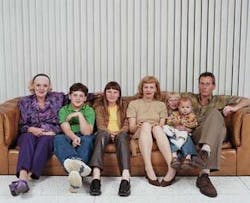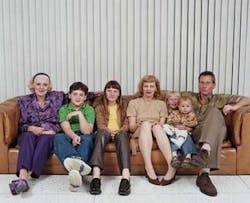Captivating a Captive Audience
by Karen Robinson, RDH
The minute a patient leans back in my chair, I have a captive audience and a golden opportunity to educate. During my 17 years as a hygienist, I have worked closely with dozens of dental professionals in several different offices with a wide variety of patients, from children to senior citizens. I have learned that despite the changing nature of problems during every stage of life, each patient must be educated in a way that speaks to him or her. You may have a captive audience, but you must realize your own potential first.
• Children — Working with children has given me the opportunity to educate patients from an early age, often before problems arise. My hope is that they will be free from disease, or at least minimize their risk because of what they learn. The most important aspect of working with children is letting them know that you understand their fear or concern. They need to know that you care and will do everything you can to take good care of them.
The environment you present is another important aspect. Kids need a kid-friendly environment with friendly faces, which my office tries hard to do. We don't push, but encourage kids.
While working with children, try to think from their perspective and present analogies that work for them. Showing them what you are going to do before you do it works well. Having younger brothers and sisters watch their older siblings receive treatment also helps.
Often at the end of their appointment they realize their anticipation was worse than the actual treatment. It's gratifying to know that I am truly making a difference in their lives and that they actually look forward to their next visit!
There's a lack of education in every age group. Parents need to know what we are teaching and should be actively involved in this process. We can't assume that they already know. Parents often comment, "You don't want your teeth to end up like mine!" How did their teeth get that way? Maybe it was a lack of home care or good dental care knowledge?
• Teenagers — Teens have so many things going on in their lives that their mouths are not always a top priority, especially if nothing hurts or bothers them. Focus on education with them. It may not impact them right away, but it will at some point. Teens are at the phase in their lives where the rules of attraction apply, and I try to use this to motivate them. Seeing is believing, so providing visuals will have an impact on what you say. I like to hand them a mirror and show them what's in their mouths: tartar, puffy gums, bleeding, plaque, etc.
• Adults — More adults have gum disease than don't. Why is this? If every dentist and hygienist took time to probe and determine the status, and then go a step further to inform and educate the patient, disease could be prevented or treated. Many times no symptoms or pain accompany gum disease and decay. Most of the adults I see have not taken proper care of their teeth and gums. Now they're sitting in my chair and it's my obligation to gather the necessary data, determine health or disease, and educate them about oral disease.
If professionals do not take the time to do this, we are responsible for the disease in our patients' mouths. They won't know unless we tell them. Patients come in to get their teeth cleaned and are told they need to brush more, floss more, do a better job, and come into the office more often. But are they really shown the proper technique, or told that they have 4, 5, and 6 mm pockets? What does this mean to them? I've learned that most people are in the dark when it comes to oral health, so this is where my passion lies. I believe that people are motivated when they are told the truth. With education and understanding, people are more motivated and proactive.
Most often, time is the reason why a complete job is not done every time. Everyone would win with just a little more time, and we have a responsibility to take that time, even if it means a few extra minutes in the chair. This can be a problem for two reasons. First, patients are accustomed to getting in, getting out, and getting on with their lives. They don't want to spend any more than the usual 30 or 40 minutes in the chair. But if 15 more minutes could save their teeth, wouldn't it be worth it? Second, time is money and dentists are running a business. However, doing the right thing by educating a patient establishes a positive relationship and becomes a win/win situation. If there is disease, it can be treated, and if not, we can educate to prevent disease. The dentist does the right thing by putting the patient first. Providing periodontal treatment will result in more of a monetary gain in the long run.
• Senior citizens — Seniors are extremely cooperative and enjoyable to work with. Physical limitations may require modified treatment and treatment time, but anything you can do for them is a plus. Many of my senior patients lead very active lifestyles and don't want poor oral health to slow them down. They are grateful for the time I take to educate and treat them.
Tapping the resources to get the job done
One of the best resources a practice can have is a periodontist in the office every day. This allows us to communicate directly and have lunch meetings as a group. This also allows me to continually update my skills. This is very important, because not only am I more knowledgeable, but I become more confidant in my position. The great thing about this arrangement for patients is that they are able to acquire all or most of their dental services in one location.
People will know you care for them by the way you treat them, not necessarily just by what you say to them. To make my patients comfortable, I strive to modify treatment and treatment time to educate each of them. One of my greatest challenges is communicating with my patients who speak only Spanish. As a non-Spanish speaker, I felt very helpless at first. I have since learned enough to communicate with a limited vocabulary and a lot of visual demonstration.
What I have learned is that when you do your job with the right intent and as efficiently as you can, you will love what you do.
Many hygienists burn out quickly from rushed 30- to 45-minute appointments that don't even begin to utilize their knowledge and skills. There is so much more to what we do. My advice is to find a dentist who values the full scope of the dental hygienist's job and who is willing to utilize this in his or her practice. We can do a lot for patients if we are allowed.
Karen Robinson is a graduate of Pueblo Community College in Pueblo, Colo., and has been practicing dental hygiene since 1985.Karen currently owns a practice with her father in Wheatridge, Colo., specializing in children's dentistry. Karen is an alumnimember of the 3M ESPE Dental Hygiene Advisory Panel.

